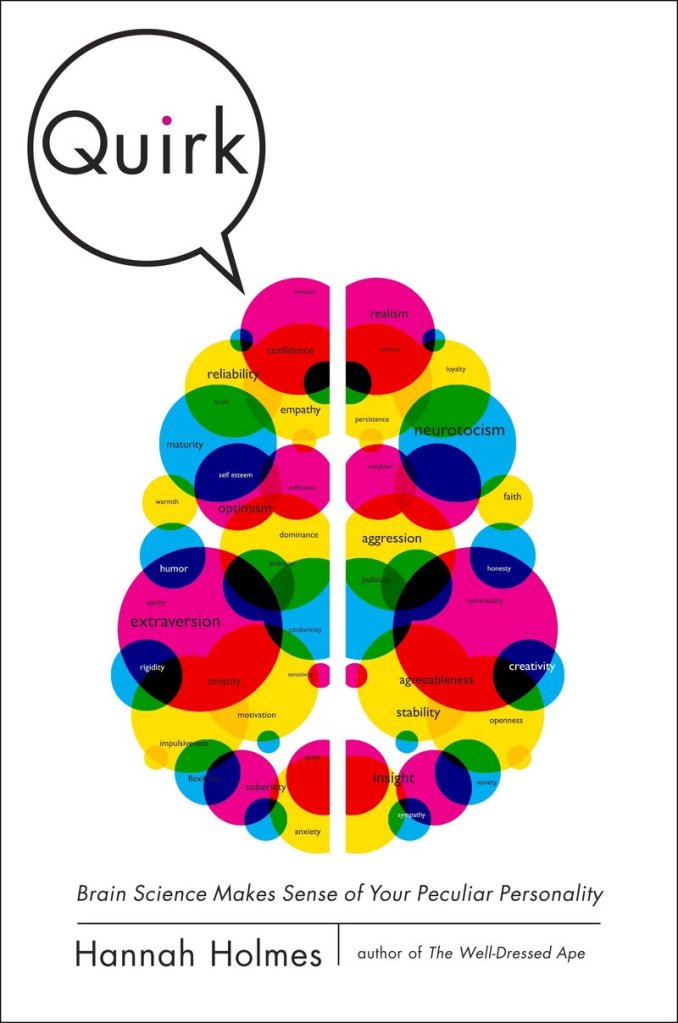Although she is not a scientist, Hannah Holmes has made a career writing about science in a literate, humorous and, yes, quirky way.
In “Suburban Safari,” she studied her South Portland yard. In “The Secret Life of Dust,” she spent an entire book on the commonplace nuisance. And in “The Well-Dressed Ape” she looked at herself as a primate.
In “Quirk: Brain Science Makes Sense of Your Peculiar Personality,” published Feb. 22 by Random House, Holmes goes through the five-factor model of personality, with the five factors being openness, conscientiousness, neuroticism, agreeableness and extraversion.
Those five factors are split up, and Holmes looks at 18 subfacets, humorously looking at how those personality traits are studied on mice (or rats), how the research is transferred to humans, and how those facets survive natural selection — even though a lot of them are at least irritating, if not downright dangerous.
Holmes’ observations produce out-loud laughter, and that humor helps people understand the science.
She started this interview by asking me if I had figured out my own personality from the book.
Q: I’m not sure if I have figured myself out. How many of these traits are most people positive in? I was very high on activeness, a bit high on artistic (for liking nature, not because what I write is art), I am fairly cheerful, but I don’t trust well. Is that too many?
A: You really need the full test. I think the benefit of doing the full test is that it helps to calculate some of the concerns about what our personality is. It crystallizes the amorphous facets of the personality and allows you to see them in context.
The full test is available through a link on my website (hannahholmes.net) with 300 questions. It is the one that is used for psychological research, but they have made it available to the public. It is fascinating.
Q: Why “Quirk”? The book isn’t really about quirky personalities but all personalities.
A: That just gets into the ugly belly of publishing. They were looking for a one-word title. My original title was “The Mouse and Me,” but the one-world title is the fashion of the moment.
Q: Are you a writer whose subject is science or a scientist who writes?
A: The prior. I went to USM and got an English degree.
Q: So how is it that you write about science?
A: It started when I was hired by an environmental magazine in the late ’80s, and environmental writing turned into science writing, trying to understand how the whole ball of wax works. That led me to working at the Discovery Channel on the launching of a website as strictly a science writer.
It was really an issue of supply and demand. It was something that I could do that allowed me to indulge my personality and get paid for it.
Q: You mentioned at one point that people can overcome these traits, although the book jacket goes farther than you do. How hard is it to overcome them? Like I am low on orderliness, but I try to improve because my wife likes things orderly.
A: Personality is largely biological, and it is largely etched in stone. But because we are highly social people and want to get along, we try to adjust to our environment. The brain is the engine of the personality, but the prefrontal cortex of the brain acts as a transmission and alters your behavior and offending people you live with by leaving your socks on the staircase.
In the same way, we see that therapy takes a person whose personality is causing them trouble and trains them to alter their behavior and then conform. Behavioral therapy is very pragmatic.
Q: You talk a lot in the book about your pet mice, and you obviously care for them. Yet you write about the research that is done on mice, and rats or primates. What are your thoughts on research on animals?
A: It is unavoidable. Without research, mice in particular, we would have no chemotherapy for cancer patients, no drugs for anxiety or depression, for schizophrenia. We’d be a wreck if it weren’t for our fortunate similarity to mice. I consider it a necessary evil, with the emphasis on “necessary.”
And increasingly, the world is getting serious about establishing a very high standard of decency to research animals, and eliminating the use of primages altogether, and asking scientists to run their experiments past an ethical board for animals just as they do for people to be sure the research is necessary.
And it is good to keep in mind the research mouse is the same mouse that breaks into your house and steals your food, and that it would go extinct without humans.
Q: What are you working on now?
A: I am going to go back and do magazine work. The book publishing industry is obviously having problems and is now more chaotic than I care to deal with. I’ve been doing some magazine work. I did a piece for National Geographic last year, and there are a couple of things I would like to work with the Smithsonian on. There are some good magazines left.
Staff Writer Tom Atwell can be contacted at 791-6362 or at:
tatwell@pressherald.com
Send questions/comments to the editors.



Success. Please wait for the page to reload. If the page does not reload within 5 seconds, please refresh the page.
Enter your email and password to access comments.
Hi, to comment on stories you must . This profile is in addition to your subscription and website login.
Already have a commenting profile? .
Invalid username/password.
Please check your email to confirm and complete your registration.
Only subscribers are eligible to post comments. Please subscribe or login first for digital access. Here’s why.
Use the form below to reset your password. When you've submitted your account email, we will send an email with a reset code.